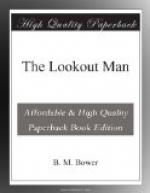Then his mind snapped back to Hank Brown with his hand clasping Marion’s arm in that leisurely climb to the trail. His black mood returned, pressing the dead weight of hopelessness upon him. He might as well settle the whole thing with a bullet, he told himself again. After all, what would it matter? Who would care? Last night he had thought instantly of Marion and his mother, and he had felt that two women would grieve for him. Tonight he thought of Marion and cast the thought away with a curse and a sneer. As for his mother—would his mother care so very much? Had he given her any reason for caring, beyond the natural maternal instinct which is in all motherhood? He did not know. If he could be sure that his mother would grieve for him—but he did not know. Perhaps she had grieved over him in the past until she had worn out all emotions where he was concerned. He wondered, and he wished that he knew.
CHAPTER TWENTY
IGNORANCE TAXES THE TRAIL OF DANGER
Mike, looking frequently over his shoulder, sought the sanctuary of his own cabin, slammed the door shut and pulled the heavy table as a barricade against it until he could find the hammer and some nails. His hands shook so that he struck his thumb twice, but he did not seem to notice the pain at all. When the door was nailed shut he pulled a side off a box and nailed the two boards over the window. Then he grabbed his rifle out of a corner and defied the spies to do their worst, and hang him if they dared.
A long time he waited, mumbling there in the middle of the room, the rifle pointed toward the door. Shadows flowed into the valley and filled it so that only the tops of the tallest pines were lighted by the sun. The lonesome gloom deepened and the pines swung their limber tops and talked with the sound of moving waters along a sandy shore.
An owl flapped heavily into a tall pine near by, settled his feet comfortably upon a smooth place in the limb, craned his neck and blinked into the wind, fluffed his feathers and in a deep baritone voice he called aloud upon his errant mate.
“Who! Who! Who-who!”
Mike jumped and swung his rifle toward the sound! “Oh, yuh needn’t think yuh can fool me, makin’ si’nals like an owl,” he cried in his indistinct gobble. “I know what you’re up to. Yuh can’t fool me!”
Far across the basin the mate, in a lighter, more spirited tone, called reassuring reply:
“Who-who-who-o-o!”
“Who! Who! Who-who!” admonished the owl by the cabin, and flapped away to the other.
Mike’s sandy hair lifted on the back of his neck. His face turned pasty gray in the deep gloom of the cabin. Spies they were, and they were laying their trap for him. The one who had called like an owl was Hank Brown. The one who had answered across the flat was the girl, maybe—or perhaps it was that other spy up on top of the mountain; Mike was not sure, but the menace to himself remained as great, whichever spy answered Hank Brown. Hank Brown had trailed him to the cabin, and was telling the others about it. Mike was so certain of it that he actually believed he had seen Hank’s form dimly revealed beside a pine tree.




